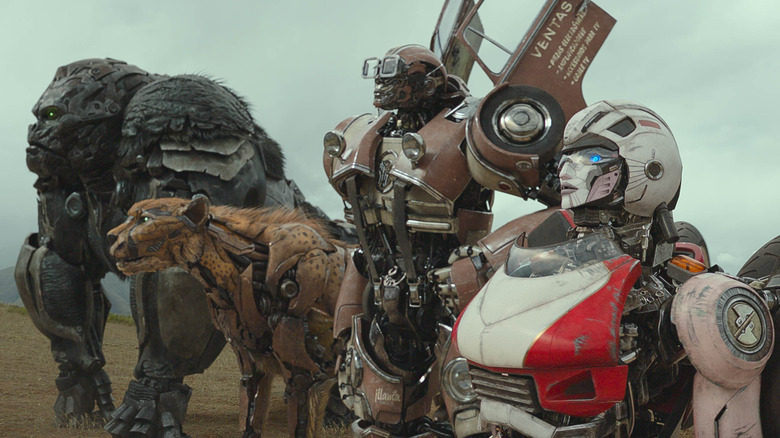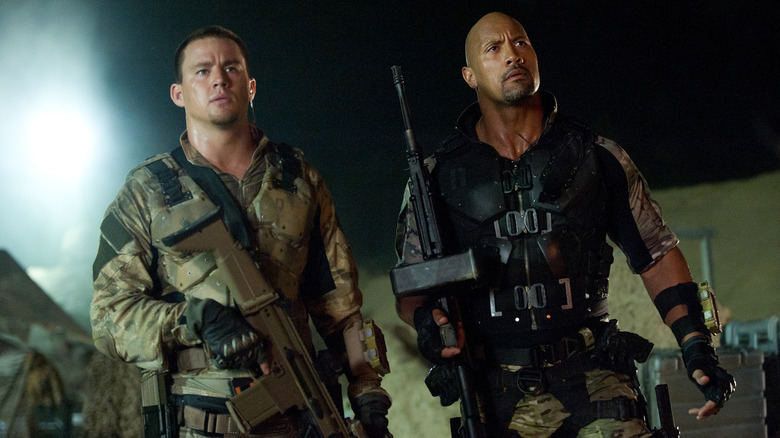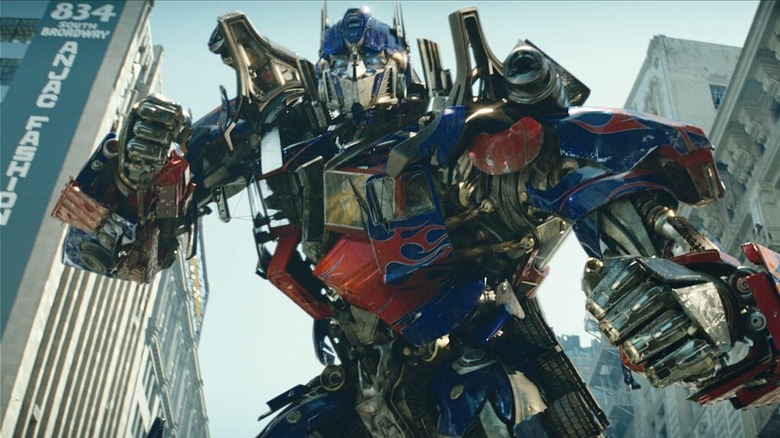Michael Bay Worried G.I. Joe Would Cheapen The Transformers Franchise
The first "eureka moment" in recorded history occurred when Archimedes, upon immersing himself in a bathtub, finally understood the concept of water displacement. It was not a discovery per se (the phenomenon had been there every time he went for a soak), but, for whatever reason, this time the light went on, and my man allegedly streaked nude through the streets of Syracuse proclaiming his discovery.
Since then, the term "eureka moment" has been used to describe everything from mind-blowing scientific revelations to unearthing a motherlode of gold — epochal occasions for the planet or an individual. Something so wild you're compelled to yell some nonsense like "Eureka!"
I would not consider, "Hey, let's put G.I. Joe and the Transformers in the same movie" to be anywhere in the atom-splitting ballpark of a "eureka moment." Especially when your studio owns the rights to both franchises, and, well, every kid who grew up with these hugely popular Hasbro toys in the 1980s made this movie in their basement on the daily.
But here is Brian Robbins, the current CEO of Paramount, boasting in a Variety profile of his "big idea" to bring the two toy lines together for a big-screen adventure. To be fair, Variety journalist Brett Lang is the one who calls it a "eureka moment," but, given the context of the piece, he's accurately reflecting Robbins' hyperbolic exec speak. Robbins, who put in two decades of directorial hackwork for the studio before ascending to the Melrose mountaintop (and made a couple of enjoyable movies in "Good Burger" and "Varsity Blues"), is obviously chuffed by his coup de tentpole.
But before he could sprint up Gower in the buff, he had to get "Transformers" capo Michael Bay's approval. And that wasn't easy.
Commercially, these toys might be headed for the attic
Robbins needed more than Bay. He also had to get Hasbro and "Transformers" executive producer Steven Spielberg to sign off.
In 2007, everyone with a financial stake in these properties would've told Robbins to go to hell. Spielberg and Bay were launching a billion-dollar franchise; they didn't want to dilute a sure thing. Hasbro, meanwhile, wanted two separate Hollywood revenue streams.
16 years after Bay's first "Transformers" movie, it's a decidedly different ballgame. The robots-in-disguise series has gone from raking in $1 billion per film to, with this year's "Transformers: Rise of the Beasts," a comparatively paltry $428 million. As for the erstwhile "Real American Hero" action figures, Stephen Sommers' "G.I. Joe: The Rise of Cobra" and John M. Chu's "G.I. Joe: Retaliation" topped out globally with, respectively, grosses of $303 million and $376 million. Only the latter (barely) doubled its production budget.
Nevertheless, according to Robbins, Bay was initially unwilling to let the Joe crew enter his far more profitable universe.
Building a bigger cinematic toy box
As Robbins told Lang, "I called [Bay] 50 times ... I would not let him off the hook. And when he finally stopped dodging my calls, we got him to sign off."
Bay's hesitance might've been due to what a crossing of the franchise streams tends to indicate in Hollywood. Universal made box-office hay in the 1930s with its monster-movie roster of Dracula, Frankenstein, the Wolf Man, the Mummy, and the Invisible Man. The films were hits, and, given their lack of dramatic prestige, were shamelessly mined for multiple sequels. When the grosses waned, Universal teamed the characters up in films like "Frankenstein Meets the Wolf Man" and "House of Frankenstein." When those films fell short commercially, Universal threw comedy duo Abbott and Costello into the mix. And that was that.
Bay knows the movie business better than most, and no doubt understood that a Transformers-G.I. Joe crossover would be a cinematic wringing of a barely damp towel. But nothing lasts forever, and he relinquished the directorial reins after 2017's "Transformers: The Last Knight." It's Steven Caple Jr.'s franchise now. Whether it continues to be a financially viable franchise will depend on either the Joes juicing that untenable global gross or a steep budget cut. You don't need to be an Archimedes to see where this is headed.


